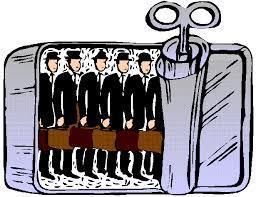This was a question exercising Richard Wolff, a self-styled Marxist economics professor, in a recent talk on Alternative Radio. Its programs monotonously demonize capitalism or U.S. “imperialism.” Wolff’s talk was in the former category, mocking the idea that the market is some perfect mechanism for producing ideal economic outcomes (an idea nobody actually holds).

What we have here, Wolff said, is a “distributional problem.” And he held forth at some length with alternative, putatively fairer ways to (re)distribute First Class seats. Anything but just selling them, to people willing to pay.

Wolff recognized that if First Class seats are conferred by one of his egalitarian methods, rather than sold, airlines would make less profit. But, he said, “who cares?”

Now here’s reality. If airlines couldn’t profit, they wouldn’t fly. You wouldn’t have seats, First Class or Sardine class. And all the people who work for airlines wouldn’t have jobs.***

Maybe you think air travel, and all other goods and services, should be provided by government, for public benefit, with no dirty profit. Some countries actually do have government-run airlines. They tend to be mismanaged white elephants that suck money from taxpayers and out of public budgets, subsidizing air travelers at the expense of everyone else.
First Class seats, that Wolff calls a “distributional problem,” are not in fact some good that’s out there waiting for an economics professor to allocate. They would not exist if they weren’t profit centers. And, while it’s true that to fetch high prices

In fact airlines get the bulk of their profits from First Class. Without that, regular seats would have to cost much more, probably pricing out most travelers, who wouldn’t fly at all, making the whole enterprise unviable.

That, Mister Marxist Professor Wolff, is market economics, and it’s a damn good thing.
By the way, when I said “a little profit,” I wasn’t being cute. In fact, the airline industry, over its entire history, has made very little profit at all, in relation to the vast amount of investment.

That again is market economics. A damn good thing.
* Though, as my wife noted, he didn’t refuse the seat, switch with some more deserving traveler, or fly economy and donate the difference to the poor.
** I’ve written about John Rawls’s famous book, A Theory of Justice, similarly treating wealth as just something out there, to be distributed, with nary a word about its creation.
*** On one flight I was treated to an ad wherein the airline’s head extolled all the numerous employees who made the flight possible, many unseen by passengers. I was indeed struck by the vast complexity of the enterprise, and how oblivious most of us are to all the cooperative efforts of the legions of people who make our civilization work.
